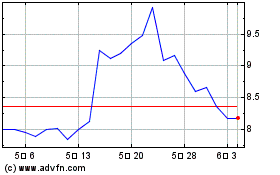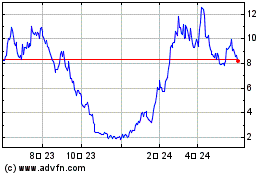New Research Reveals Genomic Profile of Seborrheic Dermatitis and Answers Key Questions on Immune Response and Skin Barrier Dysfunction
10 3월 2024 - 6:00AM

Arcutis Biotherapeutics, Inc. (Nasdaq: ARQT), a
commercial-stage biopharmaceutical company focused on developing
meaningful innovations in immuno-dermatology, highlights new
research that, for the first time, reveals the gene expression
profile of seborrheic dermatitis. The Arcutis sponsored research
from The Kimberly and Eric J. Waldman Department of Dermatology at
the Icahn School of Medicine at Mount Sinai was presented in a
scientific session at the American Academy of Dermatology (AAD)
annual meeting (San Diego, CA, March 8 – 12) and answers key
questions on the immune response and associated skin barrier
disruption of seborrheic dermatitis.
“Our research group has had a longstanding interest in defining
the immunological pathways that underlie many inflammatory skin
diseases, such as atopic dermatitis and psoriasis, shaping our
understanding of these diseases and leading to new
treatments,” said Emma Guttman-Yassky, MD, PhD, the Waldman
Professor of Dermatology and Immunology and Health System Chair of
The Department of Dermatology, and Director of the Laboratory for
Inflammatory Skin Diseases at the Icahn School of Medicine at Mount
Sinai. “We are excited to have successfully employed noninvasive
tape-stripping techniques developed from studying these diseases to
study an understudied and undertreated inflammatory skin disease,
seborrheic dermatitis. These findings will help establish the
groundwork for greater understanding of this very common
condition.”
“The pathophysiology of seborrheic dermatitis has been poorly
understood. We sought to understand the gene expression patterns in
seborrheic dermatitis in order to determine if this profile is
distinct from or similar to other immune-mediated skin conditions,”
said Benjamin Ungar, MD, director of the Alopecia Center of
Excellence and director of the Rosacea & Seborrheic Dermatitis
Clinic at Mount Sinai Health System. “Our data reveal that
seborrheic dermatitis has a distinct immunological molecular
profile. In addition, the skin barrier disruption observed in
seborrheic dermatitis has unique molecular underpinnings, primarily
in the tight junction of the epithelial skin cells and lipid
metabolism pathways. These findings are the first to characterize
the molecular profile of seborrheic dermatitis, and they will play
an important role in advancing our understanding of this common and
under-treated condition.” Dr. Ungar is also an assistant professor
of Dermatology at the Icahn School of Medicine at Mount Sinai.
The data reported at AAD are from an observational study in
which tape-strips were collected from facial lesions from 27
untreated patients with seborrheic dermatitis (Investigator’s
Global Assessment score mild [IGA 2, n=400], moderate [IGA 3,
n=19], severe [IGA 4, n=4]) and the facial skin of 18 healthy
controls and analyzed with RNA sequencing (RNA-seq). Tape-strips
are a non-invasive alternative to biopsy for transcriptome analysis
and expression profiling.
These data demonstrate that seborrheic dermatitis is an immune
disease with a uniquely polarized profile distinct from atopic
dermatitis and plaque psoriasis. In addition, skin barrier
disruption is suggested by a downregulation of tight junction and
lipid metabolism genes. Specific findings include:
- 1,374 differentially expressed
genes (DEGs) were identified between seborrheic dermatitis and
healthy controls (674 with increased expression, 700 with decreased
expression).
- Strong and significant upregulation
of Th17-related (i.e. IL23A, PI3, LL37) and Th22-related (i.e.
IL22, S100A8, S100A12) pathways were detected in seborrheic
dermatitis compared with controls.
- Seborrheic dermatitis also showed
significant Th1 activation (OASL, STAT1, CXCL9) compared with
controls.
- There was significant
downregulation of skin barrier markers (CLDN1/8, FA2H, ELOVL3) in
seborrheic dermatitis compared with controls.
- IGA positively correlated with
immune markers, including Th1/IFNG, Th17/IL17A, and Th22/IL22
[r>0.3; P<0.1 for all] and negatively correlated with skin
barrier markers (SMPD4, MGLL, PLA2G15 [r≤-0.38; P<0.05]).
“Despite the high prevalence of seborrheic dermatitis, there has
been little dedicated clinical or basic research into the
underlying cause of this chronic, inflammatory skin disease for
decades. Through this collaborative research effort, we have begun
to shed some light on the pathways involved in the immune response
and demonstrate that seborrheic dermatitis is clearly distinct from
psoriasis or atopic dermatitis, which may help explain the clinical
expression of the disease, and ultimately provide important
insights into its management,” said Patrick Burnett, MD, PhD, FAAD,
chief medical officer, Arcutis. “We are committed to advancing the
scientific understanding of this disease through additional
research and collaboration with the larger dermatology research and
clinical community.”
Mount Sinai has received grants from Arcutis for research
conducted by Dr. Ungar and Dr. Guttman. In addition, Dr. Ungar and
Dr. Guttman have served as paid consultants for Arcutis.
About Seborrheic DermatitisSeborrheic
dermatitis affects up to 10 million people in the United States,
and is a common, chronic, and recurrent inflammatory skin disease
that causes red patches covered with large, greasy, flaking
yellow-gray scales, and persistent itch. Seborrheic dermatitis
occurs most often in areas of the body with oil-producing
(sebaceous) glands, including the scalp, face (especially on the
nose, eyebrows, ears, and eyelids), upper chest, and back.
About ArcutisArcutis Biotherapeutics, Inc.
(Nasdaq: ARQT) is a commercial-stage medical dermatology company
that champions meaningful innovation to address the urgent needs of
individuals living with immune-mediated dermatological diseases and
conditions. With a commitment to solving the most persistent
patient challenges in dermatology, Arcutis has a growing portfolio
including two FDA approved products that harness our unique
dermatology development platform coupled with our dermatology
expertise to build differentiated therapies against biologically
validated targets. Arcutis’ dermatology development platform
includes a robust pipeline with multiple clinical programs for a
range of inflammatory dermatological conditions including scalp and
body psoriasis, atopic dermatitis, and alopecia areata. For more
information, visit www.arcutis.com or follow Arcutis on
LinkedIn, Facebook, and X.
Forward-Looking StatementsArcutis cautions you
that statements contained in this press release regarding matters
that are not historical facts are forward-looking statements. These
statements are based on the Company’s current beliefs and
expectations. Such forward-looking statements include, but are not
limited to, statements regarding the genetic profile and cause of
seborrheic dermatitis. These statements are subject to substantial
known and unknown risks, uncertainties and other factors that may
cause our actual results, levels of activity, performance, or
achievements to be materially different from the information
expressed or implied by these forward-looking statements. Risks and
uncertainties that may cause our actual results to differ include
risks inherent in our business, reimbursement and access to our
products, the impact of competition and other important factors
discussed in the "Risk Factors" section of our Form 10-K filed with
U.S. Securities and Exchange Commission (SEC) on February 27, 2024,
as well as any subsequent filings with the SEC. You should not
place undue reliance on any forward-looking statements in this
press release. We undertake no obligation to revise or update
information herein to reflect events or circumstances in the
future, even if new information becomes available. All
forward-looking statements are qualified in their entirety by this
cautionary statement, which is made under the safe harbor
provisions of the Private Securities Litigation Reform Act of
1995.
Contacts:MediaAmanda Sheldon,
Head of Corporate Communicationsasheldon@arcutis.com
InvestorsLatha Vairavan, Vice President,
Finance and Investor Relationslvairavan@arcutis.comDerek
ColeInvestor Relations Advisory
Solutionsderek.cole@iradvisory.com
Arcutis Biotherapeutics (NASDAQ:ARQT)
과거 데이터 주식 차트
부터 1월(1) 2025 으로 2월(2) 2025

Arcutis Biotherapeutics (NASDAQ:ARQT)
과거 데이터 주식 차트
부터 2월(2) 2024 으로 2월(2) 2025
